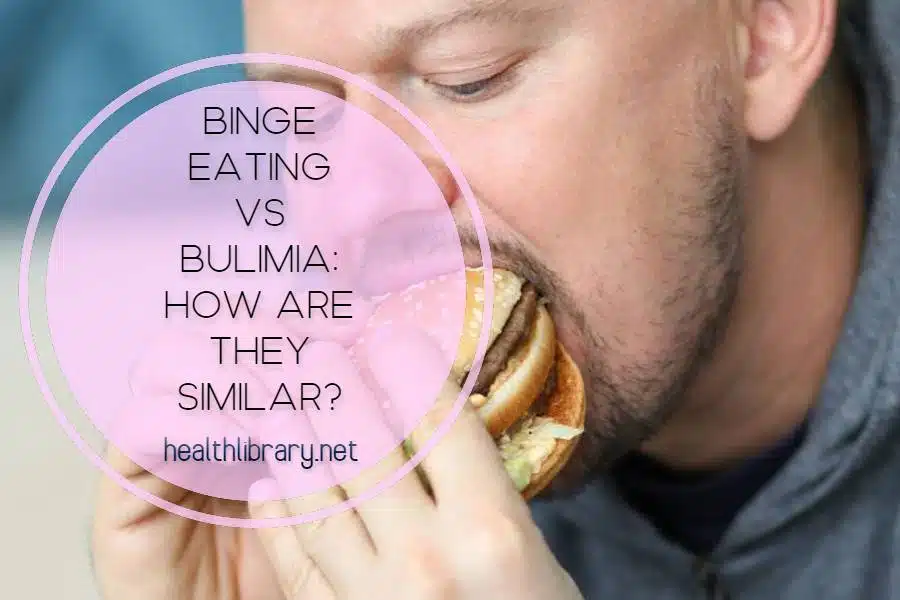Binge eating vs bulimia – two dangerous yet all too common eating disorders that can have major consequences for a person’s physical and mental health. They share similar characteristics, but come from different sources of psychological distress. Learn more about how these disorders differ and what to do if you or a loved one is affected by them.

Differentiating Binge Eating from Bulimia
Binge eating and bulimia are not the same thing. Binge eating is defined by the tendency to consume huge amounts of food in a single sitting, whereas bulimia is characterised by alternating bouts of bingeing and purging.
Furthermore, binge eating is frequently connected with a sense of losing control over one’s food, but bulimia is frequently coupled with emotions of guilt and shame that encourage individuals to eliminate any calories consumed during binges.
Underlying Causes of Binge Eating and Bulimia
Although each condition is distinct, it is worth noting that binge eating and bulimia frequently have the same underlying mental motive.
Anxiety, despair, and a need for control are examples of such reasons. People suffering from an eating disorder may experience numbness or isolation from their surroundings, or they may use food as a kind of self-medication to cope with stress or painful emotions.
Furthermore, low body image can lead to people having erroneous ideas about what is “normal” in their relationship with food.
Risk factors contributing to eating disorders
A multitude of risk factors, including genetic and environmental variables, can contribute to eating disorders.
Traumatic events, childhood obesity, social media usage, anxiety, depression, and low self-esteem, societal norms about beauty, the cost of nutritious eating, and body dissatisfaction are all potential risk factors.
It is critical to recognize that these risk factors can differ greatly from person to person, and the underlying reason for an individual’s eating problem may not be the same for everyone.
The Physical Consequences of Binge Eating and Bulimia
Binge eating and bulimia can have serious health consequences, ranging from electrolyte imbalances to gastrointestinal issues.
Both problems can cause dehydration, constipation, stomach discomfort or indigestion, dizziness or exhaustion, and poor skin health in the short term.
Long-term consequences include bone density loss as a result of a poor diet, digestive difficulties associated with purging, and inflammatory bowel disease.
Both illnesses also raise the risk of cardiac issues such as high blood pressure and heart stroke.
Identifying Common Signs of Binge Eating and Bulimia
Binge eating disorder and bulimia can have similar signs and symptoms, but key differences to look out for include:
Binge eaters frequently eat until they are uncomfortably full, whereas bulimics rarely stop eating at this point
Binge eaters typically have higher body weights, whereas bulimics usually maintain average or even low-normal weights
Bingers feel guilt or shame after the bingeing episode, whereas bulimic behaviors like purging.
Furthermore, binge is generally done in private, whereas a person with bulimia may eat huge meals in public but subsequently develop muscular imbalance, tendinitis/bursitis, joint pain/osteoarthritis, and other symptoms of purging.
Why do we binge eat?
Binge eating can occur as a result of a variety of factors such as emotional stress, boredom, anxiety, despair, low self-esteem, trauma, or genetic susceptibility.
It can also be triggered by dieting and restriction, which can produce emotions of deprivation and trigger overeating.
What triggers binge eating?
Emotional reasons such as stress, worry, despair, boredom, or low self-esteem can all lead to binge eating.
Dieting and restriction can also cause it, leading to feelings of deprivation and the desire to overeat.
Hormonal abnormalities, certain drugs, and a history of physical or sexual abuse are all issues.
Why binge eating is bad?
Binge eating may have a number of detrimental consequences for one’s health and well-being:
- It can cause weight gain and raise the risk of obesity, heart disease, type 2 diabetes, and other chronic disorders.
- Binge eating may have a detrimental influence on mental health by producing feelings of guilt, shame, and poor self-esteem, and it can lead to or aggravate disorders such as depression and anxiety.
- Binge eating can interfere with a person’s typical eating patterns, making it difficult to maintain a balanced diet.
- Binge eating can interfere with everyday tasks and duties, and it can lead to social isolation.
In severe circumstances, binge eating can lead to or aggravate an eating problem, such as binge eating disorder.
How much food is considered a binge?
The amount of food ingested during a binge varies widely from person to person and is not simply driven by the amount of food consumed.
A binge is defined as a lack of control over eating and consuming enormous amounts of food in a short period of time, which is frequently accompanied by emotions of guilt, humiliation, or anxiety.
The frequency, duration, and intensity of binge events can all play a role in deciding if an eating behavior is a binge.
Ultimately, the psychological feeling of losing control over one’s eating habit, rather than the amount of food ingested, defines a binge.